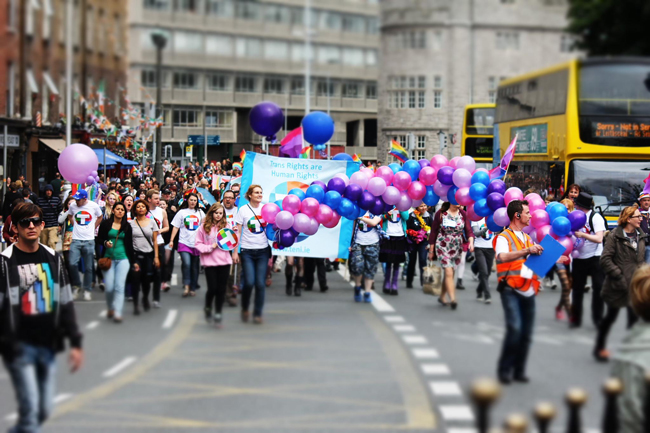The Trans Youth Forum Report, which was initiated and organised by two Trinity students, was launched today in the Office of the Ombudsman for Children. The publication and forum helped mark the International Day of Trans Visibility.
The forum sought to allow young trans people to voice the issues that affect them, while the report aims to summarise these issues and provide recommendations. Fifty-five transgender young people participated in the forum, and a National Trans Youth Survey co-ordinated by the Transgender Equality Network Ireland (TENI) and completed by 161 trans young people also formed the basis of the report. The project was primarily funded by Trinity’s Equality Fund.
The report was compiled by Peter Dunne, a second-year PhD candidate in Trinity’s Law School, and Cearbhall Turraoin, a history and philosophy student. In October, Dunne attended UK Parliament’s Committee on Women and Gender Equalities on its revision of the UK’s gender recognition legislation.
Participants in the forum raised issues around healthcare, education and legislation. In second level education, being forced to wear uniforms that do not conform with students’ preferred gender expression was raised as a problem, and issues surrounding the respect of teachers and staff of students’ preferred names and pronouns were also discussed. In healthcare, issues around the knowledge gaps of healthcare professionals, both in general and trans-specific services, were highlighted. Many participants reported having to educate their healthcare providers about trans identities, and some expressed a worry that they may educate these professionals incorrectly. Others reported a fear of coming out to their family GP in case confidentiality was broken, and a lack of available information on how to access trans-specific care.
The report also reflected participants’ dissatisfaction with the current Gender Recognition Act, which excludes people under 16 from having their gender recognised, and places restrictions on those aged 16–18. The Act will be reviewed by the Oireachtas in 2017, so highlighting the discontent of trans young people has a special importance.
Dunne and Turraoin carried out the project in partnership with TENI, BeLonG To Youth Services and Irish Trans Student Alliance (ITSA). Aside from the Equality Fund, the International Lesbian, Gay, Bisexual, Trans and Intersex Association of Europe also provided some funding, whilst Trinity’s Equality Office also provided administrative support.
The Trans Youth Forum was held last July and was the first of its kind in Ireland. Participants were broken into two groups by age, with the 18–25 year old group hosted in Trinity.
At the launch today, allowing young people to have a voice and to be listened to was a central theme. Jillian van Turnhout, a senator whose work focuses on children’s rights, spoke of her advocacy of trans young people during the Gender Recognition Act parliamentary debates. Aoife Crawford, Trinity’s Equality Officer, spoke about Trinity’s involvement with the Trans Youth Forum and emphasised the work of Luke Field, who held the role of Equality Officer before Crawford and worked with the Equality Fund when this project was approved. A panel discussion with three trans young people followed, emphasising youth voices and the event’s central theme of self-determination.
Speaking to The University Times, Aoife Crawford noted that while the process of receiving funding from the Trinity Equality Fund is a highly competitive one, the Trans Youth Forum project stood out because it “always had a national focus from the start, so it was going to influence Trinity but it was also going to influence the wider community throughout Ireland”. Crawford also highlighted the evidence-based approach of the project and the fact that “something concrete was going to come out of it”. As Crawford notes, “we now have a report that we can actually base actions on, so in that sense it has a very long term impact as well”.
In terms of the report’s impact within Trinity, Crawford notes that the findings add “further impetus” to the work of the Equality Office, which is currently implementing the Gender Identity and Gender Expression Policy through the training of frontline staff and working on the issue of gender neutral bathrooms alongside TCDSU.
Speaking to The University Times, Broden Giambrone, Chief Executive of TENI, noted that Trinity has “taken really concerted, positive steps forward” in terms of supporting trans people. He notes that Trinity’s Gender Identity and Gender Expression policy is “good practice” and that TENI have been contacted by other third-level institutions and by companies on foot of the policy. As Giambrone explains: “There is still work to do be done on the ground in Trinity, just as in every third-level and second-level school across the country in terms of supporting trans students, but certainly there has been a really positive move forward”.
Speaking to The University Times, Turraoin explained that the strategy for the project going forward will be to email the report out to politicians and groups involved with children and LGBT people. Turraoin also notes that further work needs to be done around non-binary gender recognition and spoke of plans to organise with the Irish non-binary community over the summer.







